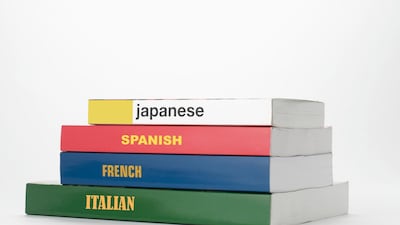In the 10 years that I have lived in Dubai, not only have I not managed to learn a new language, I have almost completely forgotten the one foreign language that I did know.
Because I was born and brought up in Cyprus, my parents were adamant that I should learn to speak Greek. They were intent on not bringing up an expat brat who only spoke English and had no real connection to the country she was born in. At the time, the post-colonial relic of a grammar school that I attended only offered Greek lessons to children with Cypriot parents – and as the natives studied syntax and grammar, the “non-Greeks” were sent off to play games or sports.
You can imagine my childish horror when my parents insisted that I was moved from one group to the other, and I had to forfeit fun for foreign language lessons. Nonetheless, I went on to study Greek through to A-level.
Truth be told, it is not a massively useful second language to have under your belt – it’s no Mandarin or Arabic. I doubt anyone has ever looked at my CV and imagined me instantly employable because I can speak the Hellenic tongue. As languages go, it falls firmly in the nice-to-have-but-hardly-essential category.
_____________________
Read more of Selina's thoughts:
The eternal quest for the perfect work-life balance
Paying tribute to the extraordinary life of my dad, the ultimate expat
Why eating meat makes me feel like a hypocrite
Phone etiquette? I need some guidelines please
After a decade, Dubai feels like it has come of age
____________________
Nonetheless, I am incredibly grateful for my parents’ foresight. To be able to speak a second language is a gift in this increasingly globalised world. Many of my non-Greek friends have spent years living in Cyprus, but still only speak the barest smattering of Greek. In a country like Cyprus and, to a certain extent, the UAE, where everybody speaks almost perfect English, it’s far too easy to get away with not making an effort. I find it heartening that schools in the UAE offer Arabic lessons to both citizens and non-citizens, however basic the tuition may be.
Unfortunately, without parental coercion, I have failed to embrace the language of my new home (despite taking a few Arabic lessons early on) and, to make matters worse, my Greek has become increasingly rusty. I only have one friend in the UAE who is a Greek speaker and we are always too quick to slip back into English when we are conversing. Beyond the odd visit to Mythos, Dubai’s favourite Greek restaurant, where I might throw in a couple of words as I place my order, there is very little opportunity to show off my second-language prowess in the UAE.
And, as everyone knows, when they are not spoken, languages are too easily lost – like muscles, they need to be constantly used or else they quickly wither away. Of late, I have been trying to force myself to read books in Greek, to at least start to get a feel for the language again. But because I am now far from fluent, this process is slow going – every page offers up a jumble of words whose meaning sits on the periphery of my memory but cannot always be retrieved.
Sentences need to be read and then reread, paragraphs become almighty obstacles and Google’s translating services are called upon with alarming regularity. But I know it’s an endeavour that I need to stick with. And as soon as I’m on track with the Greek, I should probably get back to those Arabic lessons. After all, you’re never too old to be an expat brat.

